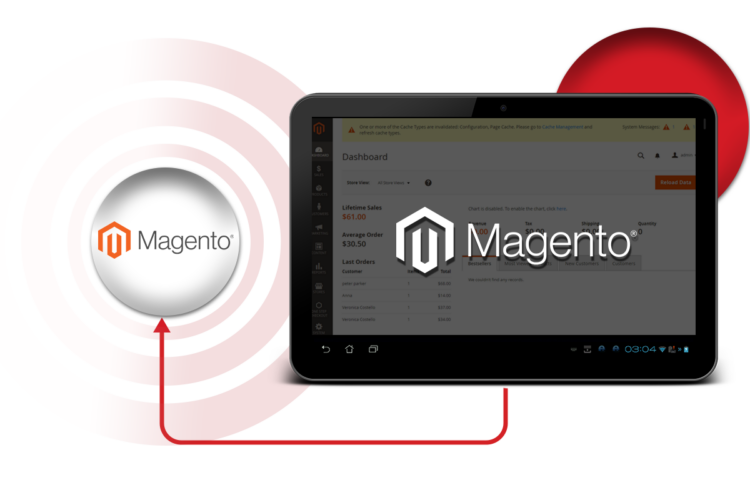The digital dimension has started a new era of business development, creating vast opportunities for global communication and outreach. Electronic commerce, or E-commerce, is one of the leading industries in this regard, as they are the trailblazers of all the modern tools and innovations that turned simple online shopping into a comfortable journey through the sales funnel. However, such a positive shopping experience doesn’t come out of nowhere, as it depends on the functionality of an E-commerce platform.
Let’s learn what the E-commerce platform is and why ‘Magento’ is a buzzword in the E-commerce world.
Page Contents
What Is an E-commerce Platform?

Source: linkedin.com
An E-commerce platform, as the name suggests, lets the business owner build their commercial presence with the help of specific sets of tools and provides a seamless and uninterrupted sell-buy process.
Before starting the search for the best Ecommerce platform, it is important to outline your requirements and vision of an E-store:
- If you are planning to settle for the simplest form of E-commerce presence, you may settle for the subscription plans offered by Shopify, BigCommerce, WooCommerce, etc. The standard subscriptions offer specific sets of tools and functionalities (quite limited) that let the client start their business in a few days. It is the fastest and the cheapest start, yet, its limited opportunities and lack of personalization will not let the E-store develop, making it one of the many stores in the global pool.
- If you are willing to establish a decent online presence and develop a brand, you need to look for customizable options, to create a unique store that makes the difference in the niche, rather than just sell the goods. That’s where Magento comes to help.
What Is Magento?

Source: zenesys.com
Magento is one of the leading types of CMS (Content Management System) software, being listed in the top 10 platforms in global terms. It is an open-source platform, developed on Zend Framework with built-in PHP.
Although Magento stands in the same row with competitors like Shopify, BigCommerce, and WooCommerce, its value is much higher, as instead of standard patterns and templates, it allows businesses to create a unique E-store, with a specific set of features. Due to its exceptional performance, Magento is the choice of global leaders like Nike, Samsung, Ford, Asus, Coca-Cola, etc.
In online space, you are sure to come across two names – Magento1 and Magento2 (its successor). Magento 2 is a faster and more user-friendly option, with SEO tools. For owners of Magento1 stores considering a migration, it’s crucial to conduct a thorough assessment and audit of their existing Magento 1 E-store. The scope of the migration, including such factors as a necessity to update or replace extensions, will have a direct influence on cost to migrate to Magento 2.
What Are the Benefits of Magento?

Source: ewm.swiss
Magento is a top platform to use for a highly functional E-commerce store, yet it requires an advanced level of knowledge and experience from the developers’ team.
1. Customization
The E-commerce industry is one of the most profitable ones, which creates a high level of competition and the need to stand out from all the available options. The uniqueness of the store can be created from a platform with an open-source nature, like Magento.
Magento allows developers to modify and enhance the initial code, adjusting the store’s characteristics and functionality according to the vision of the client. Such flexibility makes every Magento-based store different right from the start. Yet, remember, the unique features of an E-store and its smooth performance can only be reached with the help of highly skillful e-commerce application development services with a proven track of similar projects.
2. Affordability
When you compare the prices for E-commerce platforms, you will definitely doubt the Magento ‘affordability’. However, if you compare it with other open-source platforms, it is the most balanced option regarding investment and product quality.
It is important to understand that Magento development requires a whole team of developers, a top level of professionalism, experience, and of course, time – such a ‘service package’ can’t be cheap. Yet, in return, you get a one-of-a-kind product that sends the right message to the customers, attracts new audiences, and allows you to perform commercial duties uninterruptedly.
3. Single point of access
One of the best features Magento offers is the ability to monitor every point of commercial presence that you have, be it multiple websites, social media stores, or brick-and-mortar shops. Every option can be accessed through a single dashboard, which creates comfort and easiness for management and control.
4. SEO tools

Source: evolutionco.com
The uniqueness of the store will be left unnoticed unless you implement SEO techniques, which help to make your E-store visible among others.
Magento is one of the most suitable platforms for implementing SEO strategies, as it enables SEO-optimized URLs, generates HTML and XML sitemaps, configures robot.txt, and other SEO practices.
Only with the help of SEO techniques can you unlock the true potential of the store.
5. Scalability
Scalability is one of the most usable words in the business sphere, as it refers to an ability to extend the E-commerce store and its functions in response to the market demand.
At the very beginning, the stores operate with a relatively small number of orders and customers. Yet, while reaching more customers, there will be a need to add more goods and improve the bandwidth. Magento scalability accompanies businesses from the start of their way and helps build a solid infrastructure while the business grows its market influence.
The Final Thoughts
The characteristics mentioned above uncover a great deal of Magento usability, however, the list can go on and on. It is recommended to contact Magento developers, who can guide you into the world of E-commerce development and offer you the functionalities that will comply with your demand.
Magento is the most reliable tool nowadays to build your online presence and promote its efficient functioning.




